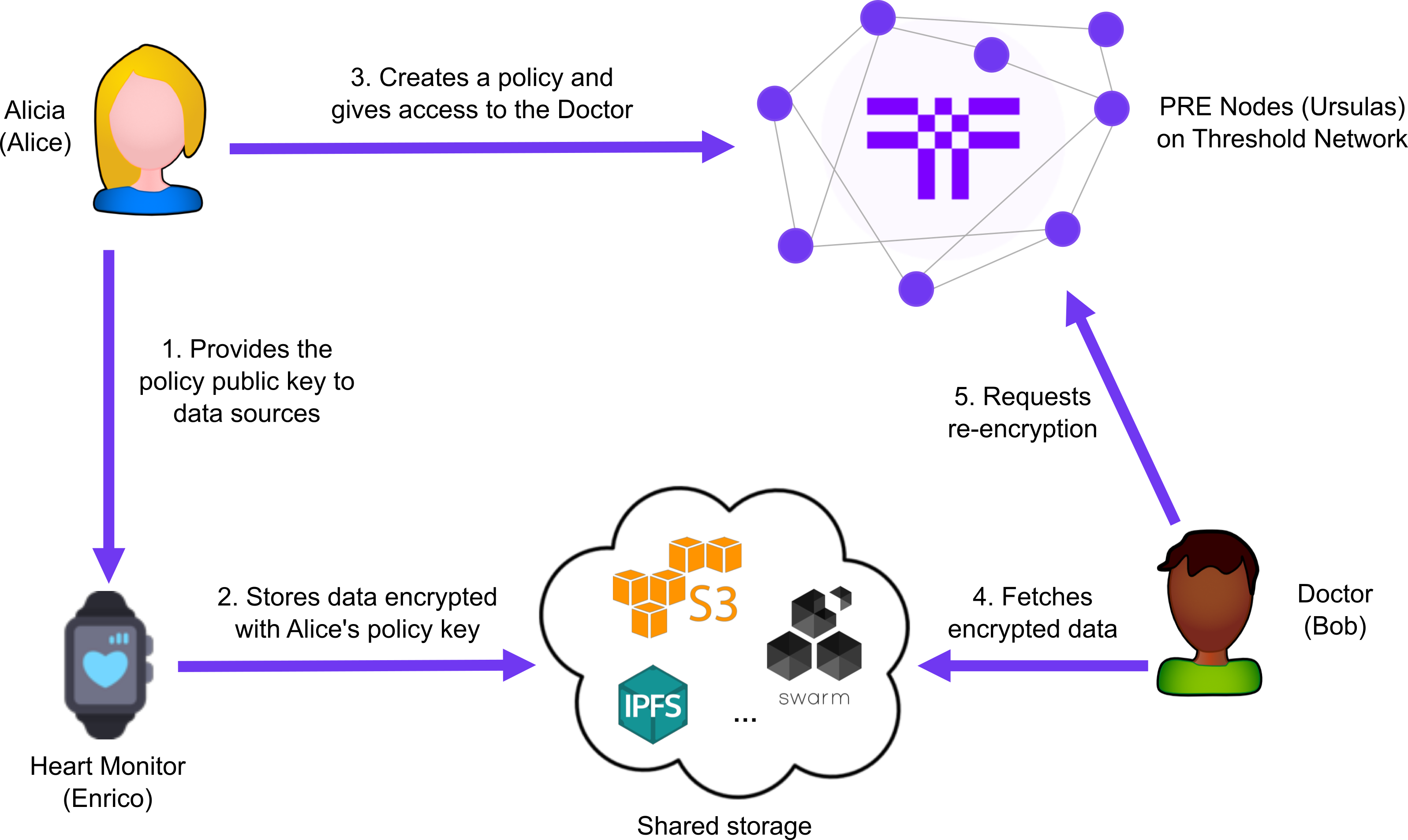4.8 KiB
NuCypher's Heartbeat Demo
Alicia has a Heart Monitor device that measures her heart rate and outputs this data in encrypted form. Since she thinks that she may want to share this data in the future, she uses NuCypher to create a policy public key for the Heart Monitor to use, so she can read and delegate access to the encrypted data as she sees fit. The Heart Monitor uses this public key to produce a file with some amount of encrypted heart rate measurements; this file is uploaded to some storage service (e.g., IPFS, S3, whatever).
At some moment, she wants to share this information with other people, such as her Doctor. Once she obtains her Doctor's public keys, she can create a policy in the NuCypher network granting access to him. After this, her Doctor can read the file with encrypted data (which was uploaded by the Heart Monitor) and request a re-encrypted ciphertext for each measurement, which can be opened with the Doctor's private key.
This simple use case showcases many interesting and distinctive aspects of NuCypher:
- Alicia can create policy public keys before knowing who will be the potential consumers.
- Alicia, or anyone knowing the policy public key (e.g., the Heart Monitor), can produce encrypted data that belongs to the policy. Again, this can happen before granting access to any consumer.
- As a consequence of the previous point, Data Sources, like the Heart Monitor, are completely unaware of the recipients. In their mind, they are producing data for Alicia.
- Alicia never interacts with the Doctor: she only needs the Doctor's public key.
- Alicia only interacts with the NuCypher network for granting access to the Doctor. After this, she can even disappear from the face of the Earth.
- The Doctor never interacts with Alicia or the Heart Monitor: he only needs the encrypted data and some policy metadata.
Decentralized Network Demo
Ensure that you already have nucypher installed.
First, configure the demo by making exporting environment variables with your provider and wallet details for ethereum and polygon.
export DEMO_L1_PROVIDER_URI=<YOUR ETH PROVIDER URL>
export DEMO_L2_PROVIDER_URI=<YOUR POLYGON PROVIDER URL>
export DEMO_L2_WALLET_FILEPATH=<YOUR WALLET FILEPATH>
export DEMO_ALICE_ADDRESS=<YOUR ALICE ETH ADDRESS>
Alternatively you can use the provided .env.template file by making a copy named .env
and adding your provider and wallet details. To set the variables in your current session run:
export $(cat .env | xargs)
Optionally, you can change the network the demo is running on by changing the value of L1_NETWORK and L2_NETWORK.
If you change these values be sure to also change L1_PROVIDER_URI and L2_PROVIDER_URI accordingly.
Available options for L1_NETOWRK are tapir or mainnet.
Available options for L2_NETWORK are mumbai or polygon
Ensure Alice's account has a bit of MATIC on polygon to pay for the policy.
Subsequently, running the demo only involves running the alicia.py and doctor.py scripts.
You should run alicia.py first:
(nucypher)$ python alicia.py
This will create a temporal directory called alicia-files that contains the data for making Alicia persistent
(i.e., her private keys). Apart from that, it will also generate data and keys for the demo.
What's left is running the doctor.py script:
(nucypher)$ python doctor.py
This script will read the data generated in the previous step and retrieve re-encrypted ciphertexts via the NuCypher network. The result is printed in the console:
Creating the Doctor ...
Doctor = ⇀Maroon Snowman DarkSlateGray Bishop↽ (0xA36bcd5c5Cfa0C1119ea5E53621720a0C1a610F5)
The Doctor joins policy for label 'heart-data-❤️-e917d959'
----------------------❤︎ (82 BPM) Retrieval time: 3537.06 ms
---------------------❤︎ (81 BPM) Retrieval time: 2654.51 ms
-------------------------❤︎ (85 BPM) Retrieval time: 1513.32 ms
----------------------------❤︎ (88 BPM) Retrieval time: 1552.66 ms
-----------------------❤︎ (83 BPM) Retrieval time: 1720.66 ms
---------------------❤︎ (81 BPM) Retrieval time: 1485.25 ms
---------------------❤︎ (81 BPM) Retrieval time: 1459.16 ms
---------------------❤︎ (81 BPM) Retrieval time: 1520.30 ms
----------------❤︎ (76 BPM) Retrieval time: 1479.54 ms
----------------❤︎ (76 BPM) Retrieval time: 1464.17 ms
---------------------❤︎ (81 BPM) Retrieval time: 1483.04 ms
----------------❤︎ (76 BPM) Retrieval time: 1687.72 ms
---------------❤︎ (75 BPM) Retrieval time: 1563.65 ms
